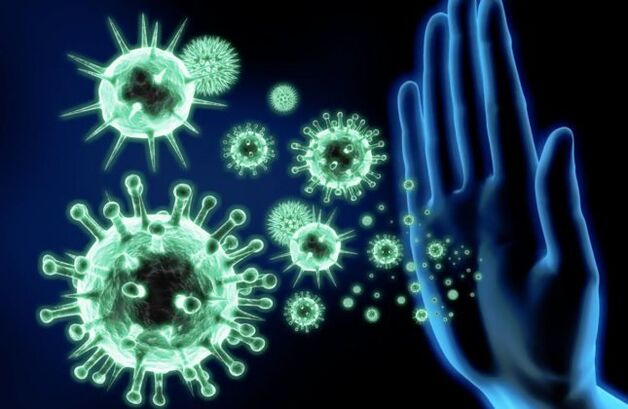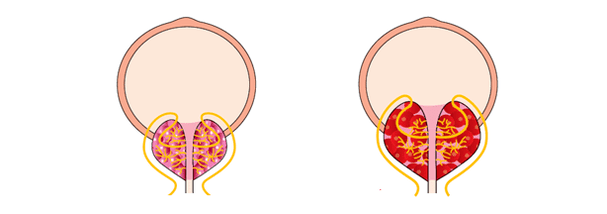Inflammation of the prostate gland tissue is quite common, the causes of prostatitis in men are infections and congestion. According to statistics, after 30 years, 30% of men already suffer from this disease and with age, the numbers increase and the disease becomes younger. As you know, the best treatment is prevention, and if we know the causes of a particular pathology, then it will be easier to protect ourselves from it.
Where does prostatitis come from?
The clinical picture of the disease may include a different set of symptoms. The most common and important are urinary disorders and sexual dysfunctions. In each case, the set of symptoms and the degree of their manifestation depend on the individual characteristics of a man, in particular, on lifestyle, general health and the work of the immune system.

According to the reasons, it is customary to distinguish two forms of the disease:
- infectious
- stagnant.
Reasons for the development of infectious prostatitis
In the infectious form of the disease, the causes of prostatitis are pathogenic microorganisms. In this case, the disease develops when a focus of infection forms in the prostate. It can occur in both acute and chronic forms, but infectious prostatitis is more often acute. At the same time, the general well-being of the man deteriorates, pain appears in the lower back, groin, the urination process is disturbed and the body temperature rises.
Acute prostatitis
The immediate causes of prostatitis in men are foci of infection, which can be localized to completely different organs. Pathogens enter the prostate either ascending from the rectum or urethra, or descending through the blood and lymph.
The most common agents causing acute prostatitis:
- Colibacillus,
- Staphylococcus aureus,
- Streptococcus,
- Gonococci.
What causes prostatitis, where are the foci of infection that lead to acute inflammation of the prostate gland? First of all, urological infections, sexually transmitted diseases, diseases of the upper respiratory tract, intestinal infections can cause prostate. Even banal caries can provoke the development of prostatitis because there is an infection in the caries teeth.
The contagious route of spread of pathogenic microorganisms is their entry into the tissues of the prostate gland from the rectum and urethra. When does this happen? Most often, this phenomenon is due to urological infections: cystitis, urethritis, pyelonephritis. The probable cause of prostatitis are sexually transmitted diseases and of these gonorrhea is the most common. If a man becomes ill with this disease, then a focus of infection is formed in him, which is located near the prostate gland. This means that pathogenic microflora can easily spread to prostate tissue. The entry of gonococcus or trichomonas into the prostate gland can occur through unprotected intercourse if the partner is ill.
The descending route of spread of the infection means its penetration through the blood or lymph from the organs located above the prostate. In this case, the causes of prostatitis lie in the negative effects on the body of infections of the throat, upper respiratory tract or oral cavity. Among the diseases that cause prostatitis can be bronchitis, flu, tonsillitis, tuberculosis. Inflammation of the prostate resulting from these problems is usually a complication and the first symptoms appear a few weeks after the underlying infection.

An important role in the appearance or not of inflammation plays the state of immunity. Not all men with foci of infection develop prostate. If the body is in an active active state, the immunity copes with the infection and the pathological process stops. Deterioration of the defense condition leads to the development of complications. They are manifested in various diseases, it all depends on individual characteristics and "weak" points in the body. The prostate gland is one of the most sensitive organs in the male body, so any negative impact can affect its condition.
Why does immunity fall? The reason for this is stress, malnutrition, a sedentary lifestyle, hypothermia. Infections themselves, especially sexually transmitted infections, become a factor in lowering immunity and contribute to the development of complications.
Chronic prostatitis
In the acute form of the disease, all the symptoms are quite bright, it is impossible not to pay attention to them, therefore, men with acute prostate, as a rule, immediately consult a doctor. The chronic form of the disease has a sluggish character, the symptoms are not very pronounced, the health condition most often remains satisfactory and the temperature is normal. It is due to the low-grade nature of chronic prostatitis that it has become so prevalent. Men do not tend to actively treat a problem that has no vivid, characteristic symptoms, so they usually do not rush to see a doctor with mild manifestations of prostatitis.
What causes chronic prostatitis? The reasons may be the same as in acute prostatitis, but due to the work of the immune system or the weakness of the pathogenic microflora, the disease does not become acute, but develops slowly. However, most often the cause of chronic prostatitis is the acute form of this disease, which has not received sufficiently effective treatment.
Reasons for switching from acute to chronic prostatitis:
- Delayed start of treatment,
- Wrong start of treatment
- Lack of treatment
- Significant decrease in immunity.
In chronic prostatitis, the inflammatory process of the prostate gland tissue is not expressed, so the symptoms may not be felt until a worsening occurs.

The peculiarity of chronic prostatitis is also that the primary inflammation of the prostate causes a deterioration of the innervation of the organ, which negatively affects its work and can cause autoimmune processes. During these processes, the immune system produces antibodies directed against the prostate gland tissue. Even after the infection clears up, such prostatitis will progress.
Causes of non-infectious prostatitis
Non-infectious prostate, i. e. congestive, occurs due to congestion in the pelvic area. Most often, it is chronic, develops gradually, over time, increasing symptoms. It is this form of prostate inflammation that occurs most often.
What causes prostatitis in men in most cases? The main reason is a violation of blood circulation, its stagnation. As a result, the organ does not receive enough food, oxygen, there is no complete flow of secretion, that is, favorable conditions for the development of inflammation appear. This condition is usually found in men who are not very active, it rarely occurs against the background of trauma.
Causes of stagnant prostatitis
- Lack of physical activity
- Work related to sitting at a table for a long time, driving a car,
- Irregular sex life
- Constipation
- Excess weight,
- Unbalanced diet
- Often restrained desire to urinate
- Smoking and alcohol abuse
- Lumbar injuries
- Characteristics of the structure of the organs of the genitourinary system.

All these reasons have a negative effect on blood circulation, both local and general. For example, smoking and regular consumption of alcohol greatly weaken the tone of blood vessels, which impairs blood flow throughout the body. The prostate gland also suffers from this. Stagnation in the pelvic organs affects men who have a sedentary job as well as those who spend a lot of time driving a car or are accustomed to resting passively on the couch. Sitting for a long time, in general, is not at all good for men's health. One way or another, the vessels that supply blood to the pelvic region are constricted and worse supply the prostate with blood.
An unbalanced diet leads to a deterioration of the general condition of the body, excess weight, poor intestinal function. All this negatively affects the state of blood circulation, especially in the organs of the genitourinary system.
Sex life is very important for men's health, it should be regular. Sexual intercourse three times a week can be considered average figures, but each has its own characteristics, which depend on a man's constitution, his desires and needs. Insufficient sexual activity leads to stagnation, as the accumulated tension inevitably does not take off. It is not only the stagnation of blood that occurs, but also the secretion of the prostate, in which harmful substances accumulate.
Excessive sexual activity is also harmful, as it requires a lot of strength from a man, leads to physical and nervous fatigue and hormonal imbalance. All this becomes a provocative factor of inflammation of the glandular tissue.
A sedentary lifestyle is one of the most common causes of prostatitis in men. Today we move a lot by transport, we climb to the upper floors by elevator, a lot has been done to make our lives easier. However, the human body, especially the male, is designed for high physical activity. To get it, men have to do some kind of sport. You can always choose what you like, what brings pleasure. Good results are obtained from daily gymnastics, consisting of simple exercises, a walk.
Anatomical features of vessels or other structures located in the pelvic region can lead to prostate obstruction. These characteristics may be due to congenital anomalies or defects, as well as acquired from trauma or other diseases. Violation of the structure of tissues, the condition of blood vessels, the formation of cysts or tumors very often leads to significant changes in the functioning of the organ itself and the arteries and veins that ensure its blood supply.
When to worry
If a man felt that he had problems with urination, he began to go to the toilet more often, he is worried about pain in the lumbar region, groin, then you should see a urologist. Even if the manifestations are small, they should not be ignored. The appearance of such symptoms suggests that unfavorable changes have occurred in the body.

In case of problems with urination, pain in the groin and lower back, you should consult a urologist!
Diagnosis and treatment
The causes and treatment of prostatitis are closely related, therefore, to successfully overcome the disease, it is necessary to carry out a thorough diagnosis.
Diagnostic procedures
- Collection of anamnesis,
- Digital rectal examination,
- Ultrasound,
- Bacteriological analysis of prostate secretion,
- Blood and urine tests,
- Analysis to determine PSA level.
These procedures give an idea of the condition of the prostate gland, make it possible to identify inflammation and its causes. PSA levels are needed to rule out adenoma and prostate cancer. Such an analysis is necessary to monitor the success of the treatment.
It is necessary to treat prostatitis in a comprehensive way, including the following methods:
- drug therapy,
- massage,
- physiotherapy,
- physiotherapy.
Depending on the cause of the disease, medications are prescribed that eliminate the infectious ingredient, improve blood circulation, urine flow and glandular secretions, and relieve spasms. The earlier treatment is started and the more responsible a man treats it, the better his results will be.
However, the most optimal thing is to prevent the disease, then you will not have to treat it. Prevention for a man is to avoid provocative causes and factors, lead a healthy lifestyle and be sexually active.
























